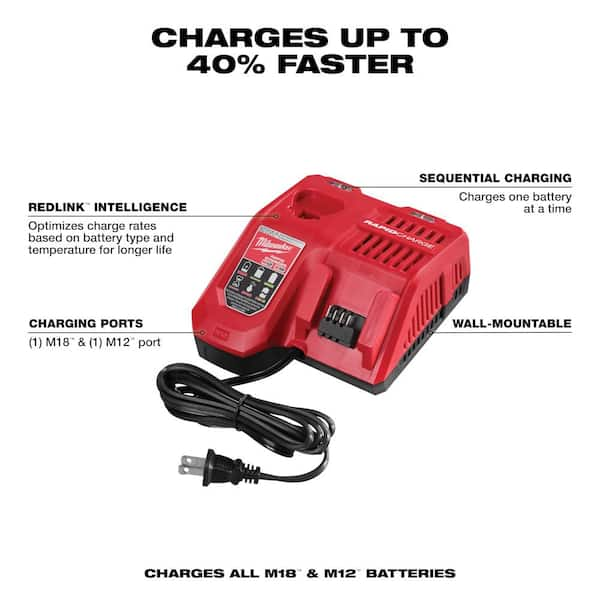Milwaukee Rapid Chargers are not bad for batteries as they are designed to charge efficiently. These chargers optimize battery performance and longevity.
Milwaukee Rapid Chargers are known for their fast charging capabilities, allowing users to quickly power up their tools and get back to work without long downtimes.
While some users may have concerns about the impact of rapid charging on battery health, Milwaukee ensures that their chargers are built with advanced technology to safeguard battery life.
By using these chargers as intended and following manufacturer guidelines, you can maximize the lifespan of your batteries and maintain optimal performance for your tools. Let’s explore the benefits and considerations of using Milwaukee Rapid Chargers for your battery-powered devices.

Contents
The Battery Myths
Myth 1: Rapid Chargers Are Bad For Batteries
Contrary to popular belief, rapid chargers are not inherently bad for batteries. While they may cause the battery to heat up during charging, modern lithium-ion batteries are designed to handle rapid charging without significant negative effects.
The key is to use chargers that are specifically designed for your device and to avoid using third-party or counterfeit chargers.
Myth 2: Overnight Charging Damages Batteries
Leaving your device plugged in overnight does not necessarily damage the battery. Most modern smartphones and devices have built-in mechanisms to prevent overcharging. However, it is still recommended to unplug your device once it reaches full charge to prolong the battery lifespan.
Myth 3: Always Let Your Battery Drain Completely Before Charging
Allowing your battery to drain completely before charging is not necessary. In fact, it is better to avoid deep discharges whenever possible as they can put unnecessary stress on the battery. It is advisable to keep your battery level between 20% and 80% for optimal battery health.
The Science Behind Battery Charging
Understanding how battery charging works is crucial for determining if Milwaukee rapid chargers are bad for batteries. In this section, we’ll delve into the intricacies of lithium-ion batteries, the role of voltage and current in charging, and how battery capacity and charging speed are interconnected.
How Lithium-ion Batteries Work?
Lithium-ion batteries are a type of rechargeable battery commonly used in various electronic devices.
These batteries operate on the movement of lithium ions from the negative electrode to the positive electrode during discharge and in the opposite direction when charging.
The positive electrode is typically made of lithium cobalt oxide, while the negative electrode consists of graphite.
The Role Of Voltage And Current In Charging
When charging a lithium-ion battery, both voltage and current play crucial roles. The voltage determines the potential energy available to the battery, while the current controls the rate at which energy is transferred.
Rapid chargers, such as those produced by Milwaukee, often deliver higher currents to expedite the charging process.
Understanding Battery Capacity And Charging Speed
Battery capacity refers to the amount of energy a battery can store. Charging speed is directly related to the current supplied to the battery. It’s important to consider the impact of rapid charging on battery capacity and overall lifespan.
The balance between fast charging and long-term battery health is a critical aspect to consider when using Milwaukee rapid chargers.
Debunking The Myths
Rapid Chargers: Friend Or Foe?
There’s a common misconception that rapid chargers are bad for batteries, but let’s debunk that myth. Rapid chargers are designed to deliver a higher current to the battery, allowing for faster charging.
Contrary to popular belief, using a rapid charger occasionally won’t harm your battery. In fact, modern batteries are equipped to handle rapid charging without adverse effects.
However, continuous and excessive use of rapid chargers can lead to increased heat generation, which may have a long-term impact on battery health.
Overnight Charging: Is It Safe?
Many believe that leaving a device plugged in for extended periods, such as overnight, can degrade the battery. However, this is a common myth.
Most modern devices and chargers are equipped with smart technology that regulates the charging process, preventing overcharging.
Overnight charging is generally safe, but it’s essential to ensure that you’re using a reputable charger and not exposing your device to excessive heat during charging.
Partial Charging Vs. Full Discharge: Which Is Better?
It’s often debated whether it’s better to partially charge your device or allow it to fully discharge before recharging. The truth is, modern lithium-ion batteries perform optimally with partial charging.
Unlike older battery technologies, lithium-ion batteries don’t have a “memory effect,” so there’s no need to fully discharge them. Partial charging not only prolongs battery life but also reduces stress on the battery, promoting overall longevity.
Best Practices For Battery Charging
Avoid Extreme Temperatures
Extreme temperatures can have a detrimental effect on your battery’s lifespan and performance. High temperatures can cause internal damage to the battery, while low temperatures can lead to a reduction in capacity. Therefore, it’s essential to avoid exposing your battery to extreme temperatures whenever possible.
Charge Your Battery Regularly
Regular charging helps maintain the health of your battery. Frequent charging prevents the battery from deep discharging, which can be harmful. It’s advisable to charge your battery before it reaches a low state of charge to preserve its longevity.
Use The Right Charger
Selecting the appropriate charger is crucial for the well-being of your battery. Using compatible chargers designed for your specific battery model and brand can help optimize charging efficiency and minimize the risk of overcharging or undercharging.
Avoid Overcharging
Overcharging can lead to damage to the battery cells, reducing their capacity and lifespan. To prevent overcharging, it’s advisable to unplug the charger once the battery reaches its full capacity, or use a smart charger that automatically stops charging when the battery is fully charged.

Frequently Asked Questions
Do Milwaukee Rapid Chargers Ruin Batteries?
Milwaukee Rapid chargers do not ruin batteries. They are designed to charge batteries quickly and efficiently without causing any damage.
However, it is important to use the correct charger for your specific battery type to ensure the best performance and longevity of your battery.
Do Fast Chargers Damage The Battery?
Fast chargers do not typically damage the battery if they are compatible with the device. Using the correct charger can actually help prolong battery life.
Is It Bad To Leave A Milwaukee Battery On The Charger?
Leaving a Milwaukee battery on the charger for extended periods can reduce its lifespan. It is recommended to unplug the battery once fully charged to prevent damage.
Is Level 2 Charging Bad For The Battery?
Level 2 charging is not bad for the battery. It provides a faster charge without harming it. It’s safe and efficient for electric vehicles.
Conclusion
While Milwaukee rapid chargers offer quick charging, they may have potential effects on battery lifespan.
It’s important to weigh the convenience of rapid charging against the potential impact on battery health.
Understanding the trade-offs can help make an informed decision about using Milwaukee rapid chargers for your batteries.

